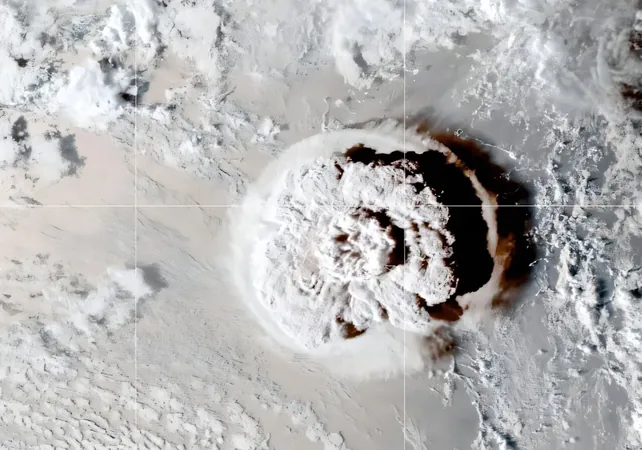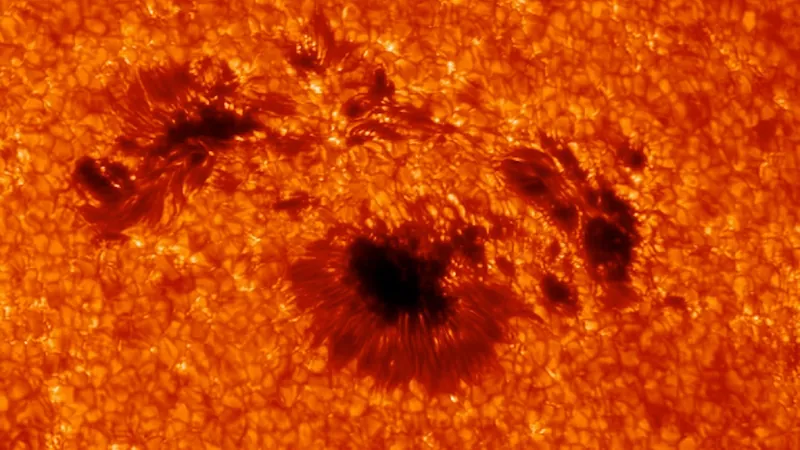
Volcanic Eruption Devastates Deep-Sea Ecosystem: The Hidden Consequences Unveiled
2025-07-02
Author: Arjun
A Deep-Sea Catastrophe
In the unseen depths of the ocean, a catastrophic volcanic eruption has left an alarming mark on marine life. Beneath the surface, tiny organisms that thrive on nutrients from hydrothermal vents were caught in a massive wave of volcanic ash, resulting in a devastating suffocation.
The Eruption That Shook the Seas
Months after the Hunga volcano unleashed a colossal eruption in 2022, marine biology and geology student Marcus Chaknova made a startling discovery. During a research expedition, he encountered an enormous deposit of volcanic ash on the seafloor—one of the largest eruptions captured in modern satellite history. This finding provided a unique opportunity to scrutinize the consequences for deep-sea ecosystems.
A Rare Research Opportunity
Chaknova, now a graduate student in Earth Sciences, collaborated with a team of 16 global researchers to analyze the ash's impact on deep-sea life. As the lead author of a groundbreaking study published in *Geochemistry, Geophysics, Geosystems*, his findings shed light on how sediment displacement affects underwater organisms—a vital piece of research in the face of potential deep-sea mining.
Tracing the Ash's Path
Chaknova embarked on a meticulous investigation to confirm the ash's origin from the Hunga volcano, situated 40 miles off Tonga. Vast amounts of sediment spread across more than 100 kilometers, showcasing the long journey ash particles make as they fall to the ocean floor. Individual grains can drift for weeks, dictated by ocean currents and winds.
The Toll on Marine Life
The eruption's aftermath buried many deep-sea creatures under thick layers of ash, depriving them of oxygen and life-sustaining nutrients. While some mobile species could escape, many were not so fortunate. With the seafloor’s delicate ecosystem disrupted, the implications for marine biodiversity could be catastrophic.
A Ripple Effect on Biodiversity
The eruption triggered unexpected consequences for ocean life, including a phytoplankton bloom at the surface, but this eventually sank and smothered coral reefs. The fallout of this event poses a serious threat to larger marine species and subsistence fishing—an essential part of life in Tonga, where nearly 82% of families rely on reef fishing.
The Future of Deep-Sea Mining
While the allure of deep-sea mining beckons with prospects of copper and cobalt riches, experts raise alarms over inadequate research into its long-term impacts. Chaknova emphasizes the necessity for sustainable practices; the area where he collected sediment is set to become a target for commercial bidding.
International Collaboration and Ethical Research
Chaknova seeks to foster international scientific collaboration, advocating for a responsible approach to research that benefits both local communities and global science. As Tonga faces pressures from companies eager to exploit its underwater resources, the balancing act between economic interests and ecological stability has never been more critical.
Conclusion: A Call for Awareness
This volcanic eruption is more than just a geological event—it's a stark reminder of the interconnectedness of our oceans and the urgent need for sustainable practices in marine exploration. As the future unfolds, the findings of Chaknova and his team may be pivotal in understanding and preserving our fragile marine ecosystems.






 Brasil (PT)
Brasil (PT)
 Canada (EN)
Canada (EN)
 Chile (ES)
Chile (ES)
 Česko (CS)
Česko (CS)
 대한민국 (KO)
대한민국 (KO)
 España (ES)
España (ES)
 France (FR)
France (FR)
 Hong Kong (EN)
Hong Kong (EN)
 Italia (IT)
Italia (IT)
 日本 (JA)
日本 (JA)
 Magyarország (HU)
Magyarország (HU)
 Norge (NO)
Norge (NO)
 Polska (PL)
Polska (PL)
 Schweiz (DE)
Schweiz (DE)
 Singapore (EN)
Singapore (EN)
 Sverige (SV)
Sverige (SV)
 Suomi (FI)
Suomi (FI)
 Türkiye (TR)
Türkiye (TR)
 الإمارات العربية المتحدة (AR)
الإمارات العربية المتحدة (AR)